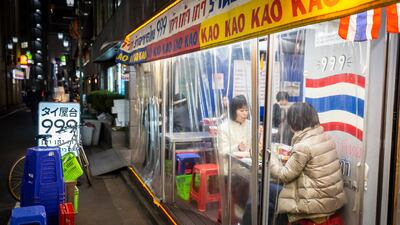Countries known for stringent Covid-19 precautions were still introducing new measures to contain the highly contagious Omicron strain at the weekend, despite a consensus that the variant causes milder illness.
The measures stood in stark contrast to those in the UK, which currently has almost no restrictions in place, and France, which is set to end limits on public gatherings early next month.
In New Zealand, which has recorded one of the world's lowest death rates from the disease, Prime Minister Jacinda Ardern has postponed her own wedding due to the introduction of new Covid-19 restrictions.
Ms Ardern said tighter rules were needed after nine cases of the Omicron variant were detected in a single family that flew to Auckland for a wedding this month.
The country was in a “red setting” state of alert, which involves measures such as mandatory mask wearing and limits on social gatherings.
In China, famous for its “zero Covid” policy, the local government in Beijing ordered more Covid-19 tests on Sunday as the city continued to report new infections, with the start of the Winter Olympics on February 4 fast approaching.
Nine locally transmitted cases with confirmed symptoms were detected in Beijing on January 22, down from 10 a day earlier, the National Health Commission said on Sunday. Six of the nine were in the city's Fengtai District, officials said.
Fengtai would organise nucleic acid tests for Covid-19 for all of its 2.6 million residents on Sunday, a statement from the district health authorities said.
Beijing has asked residents to proactively conduct nucleic acid tests if they find themselves with Covid-19 symptoms, local authorities said.
China urged people to wear masks and gloves when opening mail, especially from abroad, after authorities suggested the first case of the Omicron variant of the coronavirus found in Beijing could have arrived via a package from Canada.
Cities across China have been imposing tougher measures to control new outbreaks of Covid-19, a task that has taken on extra urgency as Beijing prepares to host the Winter Olympics.
Many cities have advised residents to stay put or require travellers to report their trips days in advance.
Japan, which initially closed its borders as the Omicron variant was first detected, has introduced new measures in cities such as Tokyo, where bars and restaurants will close early. The East Asian nation of 125 million people averaged less than one Covid-19 death per day in December, but has put new restrictions on gatherings in place until February 13.
South Korea, which has introduced a Covid-19 strategy described as “maximum suppression”, posted its second-highest daily number of coronavirus cases on Sunday, despite extended Covid-19 curbs and a high vaccination rate, raising concerns of further spread during the coming Lunar New Year holiday.
The country recorded 7,630 new cases on Saturday, the Korea Disease Control and Prevention Agency said, an increase on the 7,009 cases reported a day earlier and near its daily record of 7,848 logged in mid-December.
South Korea in mid-January extended tougher social distancing rules for three weeks, including a 9pm curfew for restaurants, cafes and bars, and limits on private gatherings, before the holiday that starts on Saturday.
Tens of millions of South Koreans typically travel during Lunar New Year, one of the country's main holidays, for family gatherings.
Positive booster data
Eric Topol, a scientist at the US National Academy of Medicine, on Sunday highlighted three recent studies which underlined the importance of booster shots.
Research by the UK Health Security Agency, the Kaiser Permanente of Southern California and the US Centre for Disease Control showed that booster shots were 88 per cent to 90 per cent effective against the Omicron variant.
The results were “fully in keeping with what we have seen over time with the Delta variant. As I previously wrote, we’re very lucky,” Dr Topol said.



















